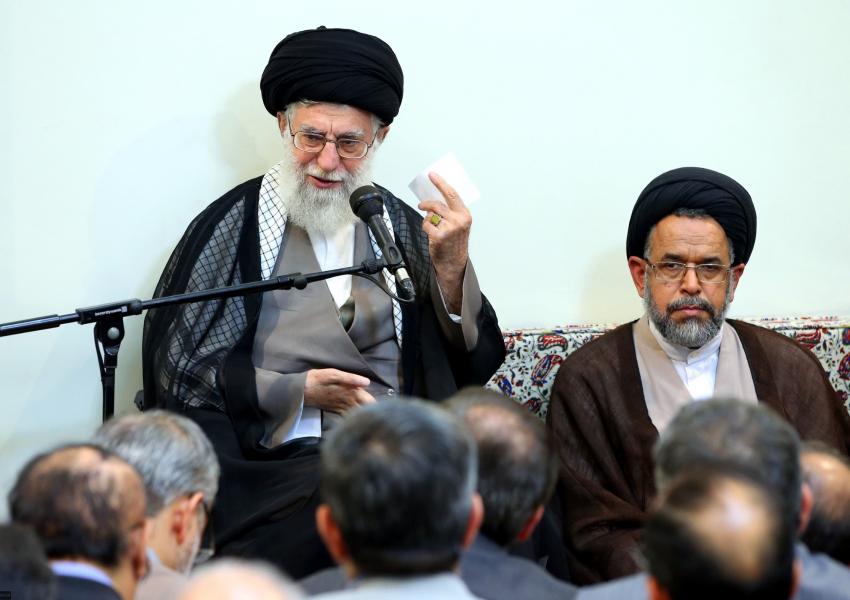
Does Intelligence Minister’s Nuclear 'Blunder' Reveal Divide In Khamenei’s Inner Circle?
Comments by Iran’s Intelligence Minister Mahmoud Alavi on the possibility of Iran being pushed toward making an atomic weapon have revealed divides in the inner circle of Iranian Supreme Leader Ali Khamenei. Alavi suggested on live television on Monday [February 10] that Iran might have to develop nuclear weapons if “backed into a corner.”
Tasnim news agency, affiliated with the Revolutionary Guards (IRGC), carried a two-part commentary on Tuesday and Wednesday calling Alavi’s comment “a major blunder.” The agency’s choice of Persian words carried an impolite connotation threatening and belittling Alavi. The agency stressed that his comments went against the country’s national interests, and against “the policies of the Islamic Republic and its leader.”
Tasnim wrote that Alavi’s suggestion would have strategic consequences. It warned that Alavi should have not expressed his “opinion,” given his words might be construed as Tehran’s official view.
Tasnim also criticized Alavi for highlighting differences among Iran’s intelligence agencies. Alavi said on TV that the Intelligence Ministry had received no tangible response after warned military intelligence in advance of the killing of Iran’s nuclear scientist Mohsen Fakhrizadeh in November 2020. The agency called Alavi’s remarks damaging and noted that if the ministry knew of the plot but did nothing to prevent it, then Alavi bore responsibility as chairman of Iran’s Intelligence Coordination Council.
What makes the controversy interesting is that Alavi is close to Khamenei, and that an intelligence minister is supposed to know what is secret and what is not. It is unlikely that a Khamenei confidant would go speak live on a televisions station controlled directly by Khamenei’s office to speak against the leader’s interests or to highlight divisions among his close aides.
While some US officials have referred to Khamenei’s fatwa (religious decree) banning the development, possession and use of nuclear and chemical weapons, Alavi suggested that fatwas could be changed.
As elaborated by analyst Mehdi Mahdavi Azad in an Iran International TV report, high-ranking clerics may annul or change their fatwa if and when they judge it necessary. For example, Ruhollah Khomeini annulled previous fatwas on several haram (prohibited) behavior and pronounced them halal (permissible).
However, the Tasnim commentary claimed that Khamenei’s opposition to nuclear and chemical weapons was not hypocritic or intended to deceive Western diplomats.
Instead, the agency argued that Khamenei’s moral position did not allow Iran to use nuclear weapons and that such use went against the essence of the Islamic Republic. The agency argued that “a nuclear bomb cannot prevent the collapse of the Islamic Republic in the same way that it did not stop the collapse of the Soviet Union.”
The commentary expressed concern that Alavi’s “odd remarks” might suggest Iran was about to start a nuclear break-out: “Countries such as Russia and China are too wise to take Alavi’s comments as the official stance of the Islamic Republic, although such remarks can limit their ability to defend Iran’s positions.” The agency warned that such “uncalculated remarks” could push Russia and China closer to the United States.
Alavi has a long political career. He has had four stints in parliament, although barred from the 2012 parliament election, and two in the Experts Assembly. The 2015 nuclear deal – signed by the US, Russia, China, Iran, Germany, the UK, and France – limited Iran’s atomic program, which Iran has expanded since US President Donald Trump left the deal in 2018.








